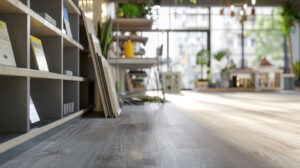
Vinyl plank flooring has gained immense popularity in recent years for its affordability, durability, and ease of installation. However, as with any product, there are both pros and cons to consider before making a decision for your home. Many interior designers, home renovators, and homeowners in communities like r/InteriorDesign often weigh in on their experiences with vinyl plank flooring. In this post, we will explore the truth behind vinyl plank flooring, highlighting its potential drawbacks and helping you decide if it’s the right choice for your living space.
Vinyl plank flooring is often praised for its practical benefits, but it’s not without its flaws. Understanding these disadvantages can help you make a more informed decision, whether you’re considering a full home renovation or simply upgrading a few rooms.
What are the negatives to vinyl plank flooring?
Vinyl plank flooring offers a lot of advantages, but it comes with some drawbacks that shouldn’t be overlooked:
- Durability: While vinyl is durable, it’s not indestructible. Heavy furniture, sharp objects, or dragging furniture can cause scratches or indentations.
- Environmental Impact: Vinyl is made from PVC (polyvinyl chloride), a plastic material that can be harmful to the environment. Although some brands offer more eco-friendly options, many vinyl products are not biodegradable and contribute to landfill waste. Learn more about eco-friendly alternatives to vinyl flooring1.
- Health Concerns: Some vinyl planks contain phthalates, chemicals that can be harmful, especially if they leach into the air. However, many modern products are phthalate-free. Read more about phthalates and their risks2.
Vinyl plank flooring isn’t the best choice if you’re looking for a long-lasting, eco-friendly material. For some, the trade-offs may not justify the benefits, especially if environmental impact and health risks are a concern.
Dive Deeper: Vinyl’s Durability vs. Real Hardwood
When comparing vinyl to hardwood, it’s easy to see where vinyl falls short in terms of long-term durability. Vinyl may resist scratches and dents better than carpet, but it can’t compare to the toughness of solid wood flooring, especially in high-traffic areas. If you’re seeking a flooring option that will age beautifully over time, real hardwood may be a better investment.
Why avoid vinyl flooring?
There are a few reasons why some people may avoid vinyl flooring:
- Non-biodegradable: As mentioned, vinyl is not biodegradable, making it a less environmentally friendly option.
- Chemical Off-gassing: Some vinyl products may release volatile organic compounds (VOCs) into the air, leading to unpleasant odors and potential health risks, especially in poorly ventilated spaces. Explore VOCs and their impact on indoor air quality3.
- Limited Lifespan: While vinyl is durable, it doesn’t last as long as hardwood or stone. Over time, it may start to show signs of wear, such as fading or becoming scuffed.
For people who prioritize eco-friendliness, health, and long-term value, vinyl might not be the best choice. It can offer short-term savings, but it may not hold up as well as other materials in the long run.
Dive Deeper: VOCs and Indoor Air Quality
VOCs are a significant concern for vinyl flooring, especially if the product is not certified for low emissions. Over time, these chemicals can negatively affect indoor air quality, particularly in homes with young children or people with respiratory issues. If you’re concerned about VOCs, look for vinyl flooring with certifications like FloorScore or GreenGuard4, which ensure a lower level of off-gassing.
Can mold grow under luxury vinyl plank flooring?
Yes, mold can grow under luxury vinyl plank flooring, especially if there’s moisture trapped beneath the surface. If the subfloor is not properly prepared or sealed, moisture can seep into the gaps and encourage mold growth. Find tips on preventing mold under vinyl flooring5.
To prevent mold, ensure proper installation with an adequate moisture barrier. If you live in a humid environment, it’s crucial to address any underlying moisture issues before installing LVP.
Footnotes
-
Discover eco-friendly alternatives like bamboo or cork for a more sustainable flooring option. ↩
-
Learn about phthalates, their potential health impacts, and how to identify phthalate-free vinyl products. ↩
-
VOCs can negatively affect indoor air quality—understand what they are and how to choose low-VOC flooring products. ↩
-
Certifications like FloorScore or GreenGuard ensure lower levels of chemical emissions in vinyl flooring products. ↩
-
Proper moisture barriers and installation techniques can help prevent mold growth under your vinyl flooring. ↩


